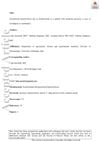Toxic Side Effects of Targeted Therapies and Immunotherapies Affecting the Skin, Oral Mucosa, Hair, and Nails
October 2018
in “
American Journal of Clinical Dermatology
”
dermatologic adverse events dAEs targeted therapies immunotherapies acneiform rash BRAF inhibitors alopecia oral mucositis mTOR inhibitors immune checkpoint inhibitors oral lichenoid reactions dexamethasone-based mouthwash stomatitis skin toxicities hair loss mouth sores immune therapy cancer treatment side effects

TLDR Cancer treatments targeting specific cells and the immune system can cause skin, mouth, hair, and nail problems, affecting patients' quality of life and treatment adherence.
The document reviewed the dermatologic adverse events (dAEs) associated with targeted therapies and immunotherapies used in cancer treatment, highlighting the impact on skin, oral mucosa, hair, and nails. Acneiform rash was the most common skin toxicity, while BRAF inhibitors were associated with secondary skin tumors and alopecia. Oral mucositis was frequently caused by mTOR inhibitors, and immune checkpoint inhibitors often led to oral lichenoid reactions. The document emphasized the significant impact of these toxicities on patients' quality of life and treatment adherence, underscoring the importance of management strategies, including prophylactic measures like dexamethasone-based mouthwash, which was shown in the SWISH trial to reduce the incidence of stomatitis. It concluded that collaboration between dermatologists and oncologists is essential for managing these side effects to maintain treatment adherence and improve patient outcomes.










